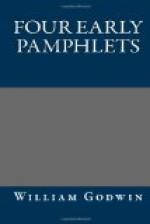Who is it?------LLOYD.
“We will not pretend however absolutely to assert that Mr. L—— wrote this poem; but we may venture to affirm, that it is the production, jointly or separately, of the new triumvirate of wits, who never let an opportunity slip of singing their own praises. Caw me, caw thee, as Sawney says, and so to it they go, and scratch one another like so many Scotch pedlars.”
In page 339, I find a passage referred to in the Index, under the head of “a notable instance of their candour,” retracting their insinuations against Lloyd and Colman, and ascribing the poem in a particular vein of pleasantry to Mr. Flexney, the bookseller, and Mr. Griffin, the printer. Candour certainly did not require that they should acknowledge Mr. Churchill, whose name was now inserted in the title-page, as the author, or if author of any, at least not of a considerable part of the poem. That this was their sense of the matter, appears from their account of the apology for the Rosciad, p. 409.
“This is another Brutum Fulinen launched at the Critical Review by one Churchill, who it seems is a clergyman, and it must be owned has a knack at versification; a bard, who upon the strength of having written a few good lines in a thing called The Rosciad, swaggers about as if he were game-keeper of Parnassus.”
P. 410. “This apologist has very little reason to throw out behind against the Critical Reviewers, who in mentioning The Rosciad, of which he calls himself author, commended it in the lump, without specifying the bald lines, the false thoughts, and tinsel frippery from which it is not entirely free.” They conclude with contrasting him with Smollet, in comparison of whom he is “a puny antagonist, who must write many more poems as good as the Rosciad, before he will be considered as a respectable enemy.”
Upon these extracts I will beg leave to make two observations.
1. Abstracted from all consideration of the profundity of criticism that is displayed, no man can avoid being struck with the humour and pleasantry in which they are conceived, or the elegant and gentlemanlike language in which they are couched. What can be more natural or more ingenuous than to suppose that the persons principally commended in a work, were themselves the writers of it? And for that allusion of the Scotch pedlars, for my part, I hold it to be inimitable.
2. But what is most admirable is the independent spirit, with which they stemmed the torrent of fashion, and forestalled the second thoughts of their countrymen. There was a time when Tristram Shandy was applauded, and Churchill thought another Dryden. But who reads Tristram now? There prevails indeed a certain quaintness, and something “like an affectation of being immoderately witty, throughout the whole work.” But for real humour not a grain. So said the Monthly Reviewers, (v. 21. p. 568.) and so says the immortal Knox. Both indeed grant him a slight knack at the pathetic; but, if I may venture a prediction, his pretensions to the latter will one day appear no better founded, than his pretentions to the former.




